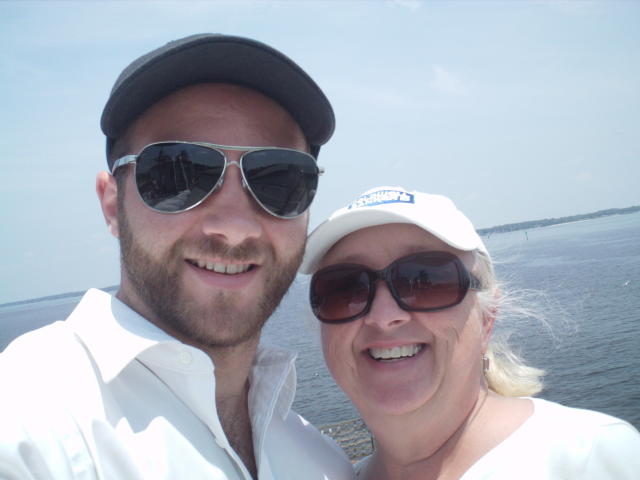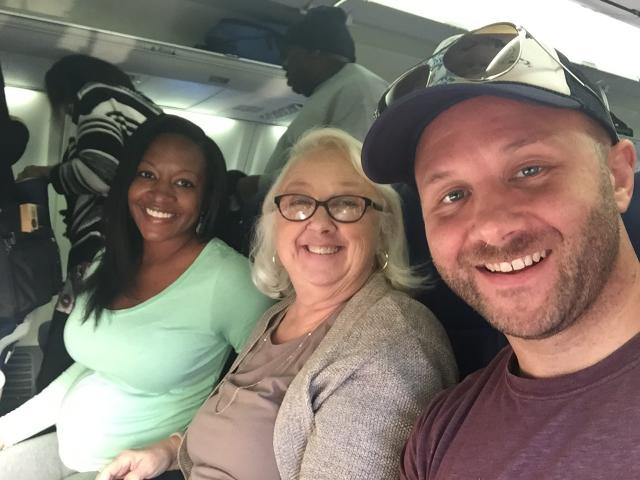
This article is more than
8 year oldIn the volatile era of Donald Trump and the transparency created by the digital age, a lot of us find ourselves on different sides of social and political issues than some of the people we love.
I grew up in eastern North Carolina among conservative farmers, but as a filmmaker, most of my colleagues are liberal artists, so I have friends and family on “both sides.” At best, I’ve seen numerous friends have to unfollow their family members on social media because they couldn’t stand reading their political posts or comments, and at worst, they’ve stopped talking to them altogether.
I couldn’t have that happen to my family, but I was in my first interracial relationship and my mom was struggling to accept it.

Race was never an issue for Maya or me, but she did have to educate me on what life as a black woman is like. This ranged from explaining black hair culture to being the only person of color in a field dominated by white men.
She was everything I ever wanted in a woman: smart, gorgeous, kind, fun and, most importantly for me, calm. She was the ice to my fire and changed me for the better as a person. She was definitely the kind of girl you bring home to meet your mother.
Before my mom came up to visit, my brother suggested that I might want to tell her Maya was black. He thought she might have a problem with it. I thought he was overreacting. It turns out, he was right.
My mom wasn’t rude when she met Maya, but she wasn’t her normal, sweet self either. I could tell the difference, but Maya had never met her so she couldn’t. Thankfully, we were at an event I was hosting and Maya and I were too preoccupied to get past formalities with my mom.
When I asked her exactly what the issue was, she simply replied, 'We just didn’t do that in my day.'
Regardless, the next morning I woke up early to have coffee with my mom and knew this would be a topic of discussion.She explained that she knew we lived different lives (for example, she is a Trump supporter) and that I have friends from many different backgrounds and cultures, but this was something new for her that she wasn’t prepared for. She did agree that Maya was a great girl, but that only confused me more. It hurt me that I even had to have this conversation.
When I asked her exactly what the issue was, she simply replied, “We just didn’t do that in my day.” I told her I understood it was different for her, but that I didn’t come from her generation and that wasn’t relevant to how I chose to live my life. I ended the conversation by telling her that I loved her, but she didn’t raise me to act like that. The words hit her hard.

My mom grew up as a Southern Baptist woman in North Carolina during a racially segregated time. Her parents taught her to care for the well-being of everyone, and she instilled those values in me and my brother. She was involved in every team, classroom and scout group I belonged to and treated kids of all races just as she treated us.
Black and white people in my hometown got along in individual cases, but there was still a stark line between the two racial groups. And even though it was just “the way things were,” this meant people would often emulate the behavior of previous generations ― sometimes casually ignorant and sometimes downright racist.
A few years ago, my mom married a man that wasn’t secretive about his bigotry. I think he said things just to be provocative, but I never understood why she didn’t confront him for the ridiculous things he said. Her silence hurt me worse than an ignorant person being ignorant.
After that first conversation about Maya with my mom, I could tell she was still struggling with our relationship, but she never said anything to me directly. I wanted to give her the time to work through it herself, though I found out later that my brother was mediating and talking with her constantly.
Several months passed, and I decided to take Maya back home with me for my birthday celebration with my family.
The night before we left, Maya could tell something was wrong with me. I hadn’t told her about any of the conflict with my family because I didn’t want to hurt her feelings or want her to think I came from a racist family.
After she finally forced me to talk, she kind of chuckled and said, “Well you obviously have no idea what it’s like to be black. You’re always surrounded by people who don’t like you because of your skin color. Unfortunately, you kind of get used it. You scared me, because I thought you were going to say you cheated on me!”
I laughed nervously, impressed with her grace and relieved to know she wouldn’t judge me based on my family’s opinions.
The birthday celebration was fun and Maya shined, as she always does. I knew then that my girlfriend wasn’t going anywhere.
After that trip, I noticed my mom making more of an effort. She would send Maya Easter baskets and birthday gifts and ask me about her more often. I knew she wasn’t completely comfortable with the situation, but she was starting to accept it, and that’s all I could ask.
Black and white people in my hometown got along in individual cases, but there was still a stark line between the two racial groups.
When Maya told me she was pregnant with our child last summer, I was elated, but as I fell asleep that night, somewhere in that happiness was the fear of how my mom would react. She was OK with us dating, but having a baby together? I wasn’t sure.
I decided I needed to tell her in person. When I did, she sighed and paused, like she had expected this to happen. She finally said, “Well I wish y’all would have been smarter about this.”
I asked her what that meant and she told me she hoped we would have been married before Maya got pregnant. Honestly, I was just happy her issue wasn’t with race anymore. I could handle not agreeing with my mom on marriage or religion.
I told her I was excited about this child and I needed her to be as well. I wanted my baby to be close to her grandmother, and my mom agreed. Our family is too important. We talked for over an hour about life, how short it is and how we should cherish what we have and who we care about. She told me that she’d spent a lot of time thinking about my relationship with Maya and she just wanted me to be happy.
It’s tricky to navigate these roads with family. We must remain firm in our own beliefs and keep progressing as a society, but we also need to be understanding of others who might not be in the same place yet. That does not mean we don’t stand up for what is right. It just means that to truly connect and communicate with someone, we must be patient, honest and loving ― especially in a time when it’s so easy to scream our opinions and then go hide behind the walls of our echo chambers.
Screaming and hiding doesn’t change anything. Love and understanding does. To quote my mom (and many other Southern mothers): “You catch more flies with honey than vinegar.”
But I wasn’t satisfied. I wouldn’t feel like Maya was a part of the family until one more thing was done.
I asked my mom if she was worried about telling her husband about the baby.
“A little bit,” she said. “But I told him recently that I was sick of hearing him say stupid things like he does all the time. If he ever said anything negative about you or your brother, or someone you cared about like Maya ... I just don’t know what that would mean for us. It would change everything and I’m afraid we wouldn’t be able to recover.”
I was proud of her. Just months before, she was struggling to accept my interracial relationship. Now she was defending it, facing the status quo that she’d known for so long. When she told me that, I realized that it’s never too late for people to change.
I told her to give him the benefit of the doubt. I thought that spending real time with Maya would actually help him grow. From my experience, people are usually scared of things or people they’re not familiar with. If they get to know people they think are different from them, they might find out how alike they really are.
From my experience, people are usually scared of things or people they’re not familiar with. If they get to know people they think are different from them, they might find out how alike they really are.
No matter how ugly things get at times, no matter how much we disagree with one another, there is no replacement for family. We must fight to keep it together, but at the same time we must fight to make it better.
Months later, I brought a very pregnant Maya home for her first Christmas with my family. It was her first Christmas away from her family, too, so this was big for both of us.

On Christmas morning, we all trotted downstairs to open presents. When Maya entered the living room, I noticed her glance up to see the stockings hanging from the mantel. We both saw a brand new one with her name inscribed on it hung with the rest of the family’s.
At that moment, I felt completely at home and at peace surrounded by the people I love, despite our differences.
I’m excited to raise a biracial child, and I hope her experience with two cultures will help us continue to blur those lines we drew long ago. We don’t have it all figured out yet, but as long as we start with love, patience and understanding, I think we’re heading in the right direction.